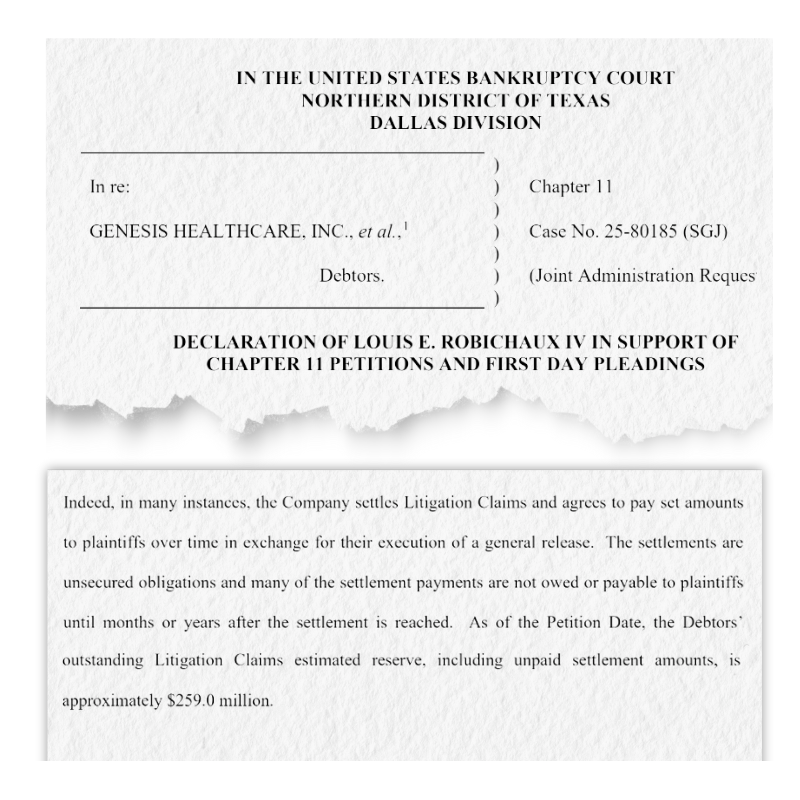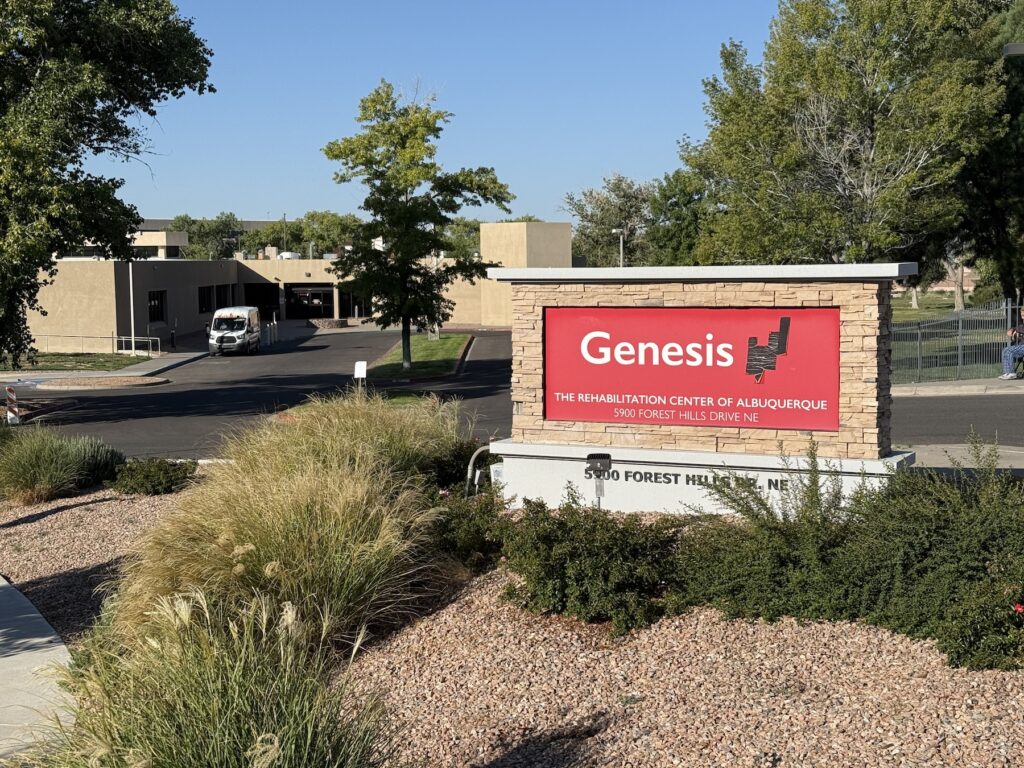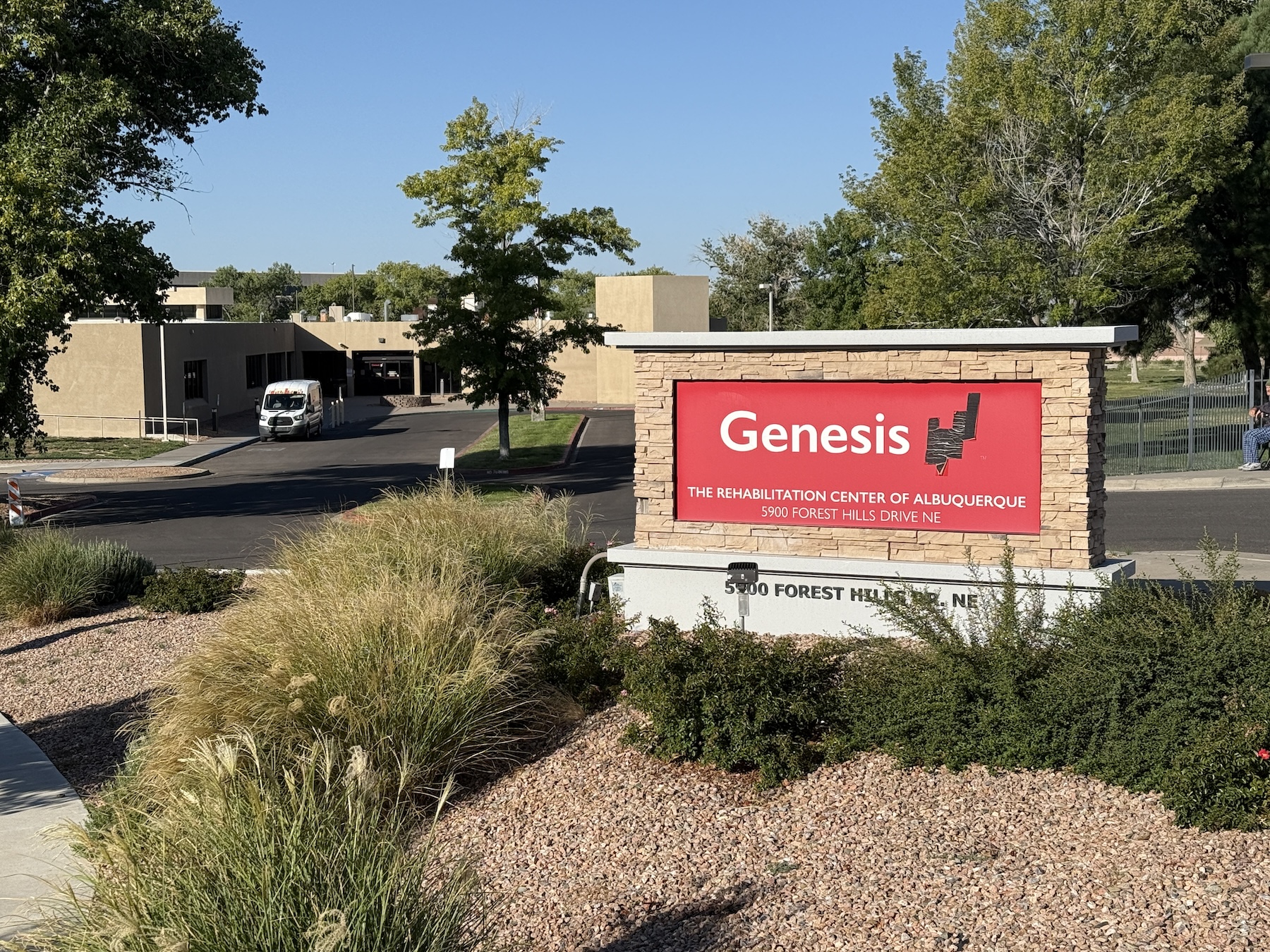
Reporting here is a part of New Mexico Political Report’s ongoing series exploring the quality of care available to New Mexicans through the state’s public and private healthcare system. Follow our series for more on the changing landscape of ownership, profits and health impacts on the system. Read more here.
Reported by: Pat Davis and Kevin Hendricks, NM Political Report
This report is original reporting by a New Mexico-based independent journalist with support NMreports.org and its readers and sponsors.
After a private equity cash-out, paying millions in CEO bonuses, a troubled private equity health chain tells a bankruptcy court it can’t afford to pay millions in staffing, care and malpractice costs, including to New Mexico families and taxpayers
Like a lot of families caring for aging elders, the family of a San Juan County senior citizen transferred him from another healthcare facility to the Bloomfield Nursing and Rehabilitation Hospital in July 2022 so he could be closer to family. For more than two years he suffered numerous falls, urinary tract infections, dehydration and longterm pain before he was transferred to another facility where he was deemed too high risk to undergo the surgery needed to treat his broken bones.
Lawyers helping the family sort through medical records and regulatory documents found that the facility failed to meet federal nursing staffing levels for 95% of the 800-plus days he was under their care.
That facility, like 25 others in New Mexico and almost 200 nationwide, is run by private equity health giant Genesis Healthcare which recently sought federal bankruptcy protection to avoid paying out hundreds of millions in malpractice and settlement expenses, payroll obligations and vendor payments, including tens-of-millions of dollars owed to New Mexico families, workers and taxpayers.
In bankruptcy filings filed in late July, Louis E. Robichaux IV, Genesis’s co-restructuring manager, told the court that bankruptcy is required because of obligations “funding of approximately $8 million per month in settlement and defense costs arising from alleged personal injury and wrongful death claims, most of which date back many years… As of the Petition Date, the Debtors’ outstanding Litigation Claims estimated reserve, including unpaid settlement amounts, is approximately $259.0 million [nationwide].”

Court records show that the largest of those outstanding litigation and settlement line items is $2.9 million assigned to the wrongful death case of a New Mexico Genesis resident represented by the Parnall and Adams law firm in Albuquerque. A bankruptcy plan could set aside or limit the assets available to pay victims.
New Mexico court dockets include dozens of other allegations of wrongful death, inadequate care and short staffing at Genesis facilities filed since 2021, when the company, claiming near-bankruptcy and cashflow issues, took in over $665 million in COVID grants from federal and state agencies designed to increase staffing, then paid their CEO over $5 million in bonuses.
A Washington Post analysis of federal nursing home data found that over 2,800 Genesis patients died in the early months of the pandemic and “nearly all of the company’s nursing homes reported continuing shortages of personal protective equipment through the months of the pandemic,” despite paying out large executive bonuses.
All told, the company reported over $1 billion in debts to the court, though much of it appears to be to real estate and payroll companies owned by Genesis and other private investors and affiliates of the private equity firm ReGen Healthcare.
Other large New Mexico claims include $2.9 million owed to the State of New Mexico and $1.4 million owed to Blue Cross Blue Shield of New Mexico. It also lists $13.8 million owed to a New Mexico-based healthcare staffing agency it owns in Albuquerque.
Quality of care and low staffing
Allegations of neglect and mistreatment in these facilities underlie dozens of lawsuits filed in New Mexico courts against Genesis and its affiliated facilities, which have received some of the state’s lowest rankings for staffing and care from federal watchdogs. State facility inspections reviewed by New Mexico Political Report found that state inspectors routinely documented specific failures in care related to staffing and training at New Mexico’s Genesis facilities.
Court documents filed in the Albuquerque case listed in Genesis’ bankruptcy filings show that a 67-year old Sandoval County woman died in The Rehabilitation Center of Albuquerque, a Genesis facility, in 2020 after experiencing weeks of declining health. Medical records summarized in the lawsuit allege nursing staff failed to treat a fall and hid her worsening condition from her family before her death.

The year before, in 2019, state inspections documented instances where the facility had failed to properly investigate unknown injuries and failed to prevent abuse or neglect. An executive told a state inspector, “the facility is using a lot of agency nurses right now” and the executive felt like “they just don’t care.”
In one recently filed lawsuit reported by NM Political Report, a San Juan County man admitted to Genesis' Bloomfield Nursing and Rehabilitation Center in 2022 suffered a hip fracture, urinary tract infection and dehydration before being transferred to a hospital where he ultimately died. Years of staffing data reported to the federal Centers for Medicare and Medicaid Services (CMS) and compiled by The Ron Bell Law Firm and Riddick Law showed that staffing levels “fell short of the CMS threshold level of 2.8 hours of nurse aid care per resident per day for all 821 days” of the patient’s stay. CMS standards note that maintaining minimum staffing levels was necessary to avoid UTIs and falls, among other issues.
In the Bloomfield case, at least five surveys by the state’s Department of Health between 2022 and 2024 found that the facility failed to meet standards of care, including multiple documented instances of a “failure to assess… when there is a significant change in condition” and failing to maintain infection prevention programs. Other facility surveys and inspections by DOH for other Genesis facilities around the state reviewed by New Mexico Political Report identified more instances of Genesis staff failing to document or report falls or near-falls.
The most recent Medicare ratings give the Bloomfield facility just two of five stars for staffing on its dashboard tracking quality of care in facilities that receive federal reimbursement for healthcare. That same tracker found that 69% of nurses “turned over” or stopped working in the facility in a year, much higher than New Mexico’s average of 54% which itself is higher than the national average at 43%.
Private equity failures draw scrutiny
A 2023 National Bureau of Economic Research study of private equity ownership in nursing facilities found that staffing levels contributed to declines in patient well-being in facilities owned by private equity. “Private equity increased patient mortality by 11%”, the study concluded. “Declines in measures of patient well-being, nurse staffing, and compliance with care standards help to explain the mortality effect,” the authors found. The study was led by Atul Gupta of the Wharton School of Business in Pennsylvania and published in Oxford University’s Review of Financial Studies.
An analysis of Genesis’ bankruptcy filings by the Private Equity Stakeholder Project, a nonprofit economic research group, found that one of Genesis’ largest creditors, WAX Dynasty Partners, shares ownership with ReGen Healthcare, which is itself affiliated with private equity firm Pinta Capital Partners. Genesis’s largest creditor, WAX Dynasty Partners, is connected to private equity firm Pinta Capital Partners through shared ownership with ReGen Healthcare.
That interconnectedness allows the management company to sell off a health group’s real estate into connected real estate investment trusts and distribute profits to shareholders, “rather than reinvesting the money to improve patient care”, according to a Cornell University report explaining how private equity approaches profit in healthcare.
That scenario played out for Genesis in 2011 when it sold the real estate under 147 of its facilities to Healthcare REIT Inc., now called Welltower, for a $2.4 billion payment benefiting shareholders but burdening the company with long-term lease payments.
Robichaux told the current bankruptcy court that the transaction a “pivotal moment” for the company. But in 2021, Welltower canceled many of Genesis' leases for nonpayment, sending the company into near-bankruptcy only prevented by government Covid grants and a $50 million investment from a new private equity owner, ReGen Healthcare.
“The company’s operations became increasingly more difficult to manage, subject to significantly disparate state landscapes, and mired in corporate inefficiencies that followed numerous mergers and acquisitions,” the Robichaux wrote to the court in July. “However, through a capital infusion by a private investment entity, ReGen Healthcare, LLC (“ReGen”), and a restructuring of its master lease with its largest landlord, Welltower, the company was able to narrowly avoid a bankruptcy filing in March of 2021.”
Fast forward to 2025 and payments to the private equity landlord Welltower now equal more than $116 million, according to the court filings.


